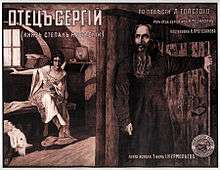Father Sergius (1918 film)
Father Sergius (Russian: Отец Сергий, translit. Otets Sergiy) is a 1918 Soviet Russian silent film directed by Yakov Protazanov and Alexandre Volkoff. It is based on the story of the same name by Leo Tolstoy.[1]
| Father Sergius | |
|---|---|
 | |
| Directed by | Yakov Protazanov Alexandre Volkoff |
| Produced by | Joseph N. Ermolieff |
| Written by | Leo Tolstoy (novel) Alexandre Volkoff |
| Starring | Ivan Mosjoukine |
| Music by | Y. Bukke |
| Cinematography | Fédote Bourgasoff Nikolas Roudakoff |
Release date |
|
Running time | 112 minutes |
| Country | Russia |
| Language | Silent film with Russian intertitles |
This was the first film version of the story, as the depiction of priests was not permitted in the film industry of the Russian Empire until after the October Revolution in 1917.[1] Ivan Mosjoukine plays the title role.[1]
Father Sergius was screened in the United Kingdom in 1920 and 1927.[1]
Plot summary
During the reign of Russian Tsar Nicholas I. Prince Kasatsky discovers that his fiancée has an affair with the Tsar. He decides to break his engagement and retires to a convent where he tries to reach holiness.[2]
Reception
A review in The Bioscope, from the time of the film's screening in the United Kingdom in 1920, was critical of the technical qualities of the film, but commented on Moskoujine's "remarkable emotional acting", stating that the film's "emotional power and sincerity will be recognised by every spectator".[3]
Cast
- Ivan Mosjoukine as Prince Kasatsky, later Father Sergius
- Olga Kondorova as Countess Korotkova
- V. Dzheneyeva as Maria - her daughter
- Vladimir Gajdarov as Tsar Nicholas I
- Nikolai Panov as Kasatsky's father
- Natalya Lisenko as Widow of the merchant Makovkin
- Iona Talanov as Merchant
- Vera Orlova as Merchant's daughter
- Pyotr Baksheyev
- Polikarp Pavlov
- Nicolas Rimsky
References
- "The Film Society". Yorkshire Post and Leeds Intelligencer. 14 February 1927. Retrieved 29 December 2018 – via British Newspaper Archive.
- Review and synopsis "A cinema history". Retrieved 25 March 2014.
- "Father Sergius". The Bioscope. 11 March 1920. Retrieved 29 December 2018 – via British Newspaper Archive.